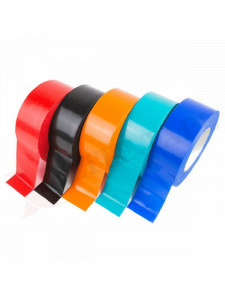The Importance of PVC Tape for Electrical Wires
In the realm of electrical installations and repairs, safety and reliability are paramount. One of the unsung heroes of electrical maintenance is PVC tape, also known as electrical tape. This seemingly simple product plays a critical role in ensuring the longevity and safety of electrical wires, providing insulation, protection, and a host of other benefits that are often overlooked.
What is PVC Tape?
PVC tape is made from polyvinyl chloride, a type of plastic that offers excellent electrical insulation properties. It is designed specifically for electrical applications and is known for its flexibility, durability, and resistance to heat and moisture. This makes it an ideal choice for various environments, whether indoors or outdoors. Its ability to conform to irregular shapes makes it easy to wrap around wires, ensuring a snug fit that enhances insulation.
Primary Uses of PVC Tape in Electrical Applications
The primary function of PVC tape is to insulate electrical wires. While wires are typically coated with insulation, damage can occur during installation or due to wear and tear over time. PVC tape serves as a reliable method to reinforce or repair damaged insulation, preventing electrical shorts or accidental contacts that could lead to serious hazards.
In addition to insulating wires, PVC tape is also used to bundle cables together. This not only keeps wire arrangements tidy but also reduces the risk of tangling and potential damage. By using PVC tape to organize cables, technicians and homeowners alike can create safer and more manageable electrical setups.
Another notable application of PVC tape is in marking and color-coding wires. Different colors of electrical tape can be used to identify various circuits, making it easier to troubleshoot and maintain electrical systems. For instance, black tape might be used for general wiring, while red could signify a live wire. This color-coding system can be invaluable in complex installations where many wires are involved.
Advantages of Using PVC Tape
pvc tape for electrical wires

One of the main advantages of PVC tape is its affordability. Compared to other electrical insulation methods, PVC tape is relatively inexpensive and widely available. This cost-effectiveness makes it accessible for both professional electricians and DIY enthusiasts.
Moreover, PVC tape is user-friendly. It can be unwound and cut to the desired length without special tools, making it simple for anyone to use. The tape's self-adhesive feature means it can easily stick to various surfaces, ensuring a secure and lasting application.
Durability is another key benefit. PVC tape can withstand various environmental conditions, including moisture, heat, and UV light. This resilience ensures that the tape will perform effectively in diverse settings, from indoor electrical panels to outdoor installations.
Precautions When Using PVC Tape
While PVC tape is an excellent tool for electrical applications, users should exercise caution. It is important to ensure that the surface of the wire is clean and dry before applying the tape for optimal adhesion. Furthermore, users should be aware of the voltage rating of their PVC tape; using it on high-voltage wires can lead to compromised safety.
Additionally, while PVC tape provides excellent insulation, it should not be the sole method of electrical protection. Proper wire insulation and protective covers should always be used alongside PVC tape to guarantee safety.
Conclusion
In summary, PVC tape is an indispensable tool in the arsenal of electrical maintenance. Its properties of insulation, flexibility, and durability make it a go-to solution for a variety of electrical tasks. Whether you are a professional electrician or a DIY enthusiast, understanding the importance of PVC tape for electrical wires can significantly enhance the safety and reliability of any electrical project. So next time you tackle an electrical issue, don’t overlook the power of this versatile tape—it’s a small tool that makes a big difference.
-
XIANGFAN Rubber Tape-Ultimate Solutions for All Your Insulation NeedsNewsJun.24,2025
-
XIANGFAN Rubber Tape-Protection for Industrial and Residential ApplicationsNewsJun.24,2025
-
XIANGFAN Rubber Tape: Superior Safety and Sealing for Demanding EnvironmentsNewsJun.24,2025
-
XIANGFAN Rubber Tape: Reliable Solutions for Every Electrical ChallengeNewsJun.24,2025
-
XIANGFAN Electrical & Industrial Tape: Powering Reliability Across IndustriesNewsJun.24,2025
-
XIANGFAN Electrical & Industrial Tape: Excellence in Every ApplicationNewsJun.24,2025
